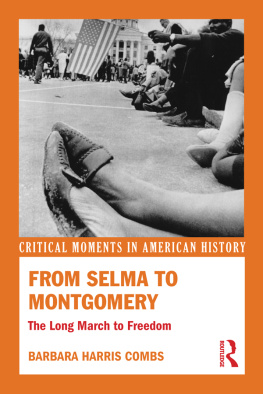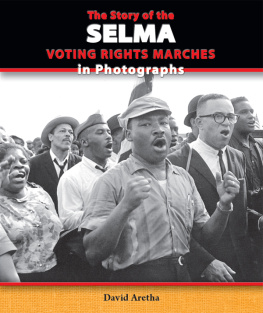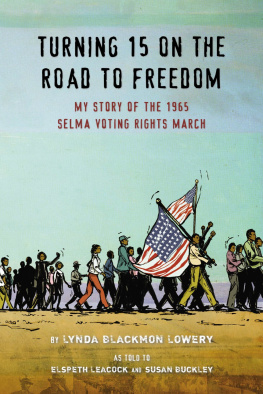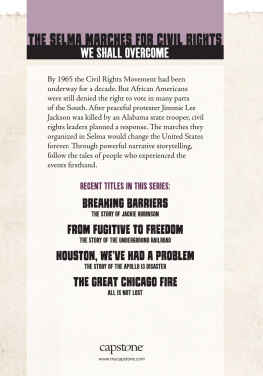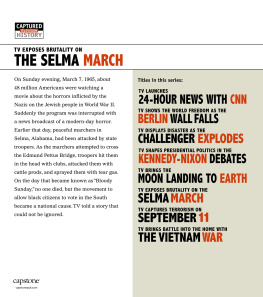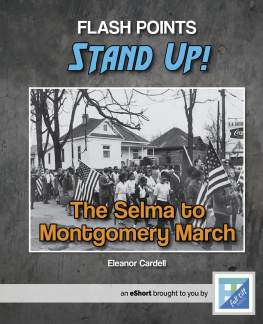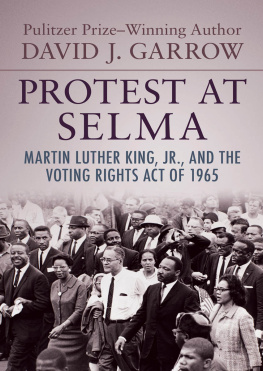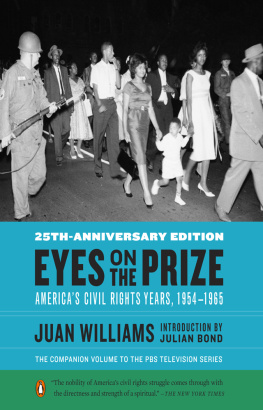From Selma to Montgomery
On March 7, 1965, a peaceful voting rights demonstration in Selma, Alabama, was met with an unprovoked attack of shocking violence that riveted the attention of the nation. In the days and weeks following Bloody Sunday, the demonstrators would not be deterred, and thousands of others joined their cause, culminating in the successful march from Selma to Montgomery. The protest marches led directly to the passage of the Voting Rights Act of 1965, a major piece of legislation, which, 95 years after the passage of the Fifteenth Amendment, made the practice of the right to vote available to all Americans, irrespective of race. From Selma to Montgomery chronicles the marches, placing them in the context of the long Civil Rights Movement, and considers the legacy of the Act, drawing parallels with contemporary issues of enfranchisement.
In five concise chapters bolstered by primary documents including civil rights legislation, speeches, and news coverage, Combs introduces the Civil Rights Movement to undergraduates through the courageous actions of the freedom marchers.
Barbara Harris Combs is Assistant Professor of Sociology and Southern Studies at the University of Mississippi.
Critical Moments in American History
Edited by William Thomas Allison, Georgia Southern University
The Assassination of John F. Kennedy
Political Trauma and American Memory Alice L. George
The Battle of the Greasy Grass/Little Bighorn
Custer's Last Stand in Memory, History, and Popular Culture
Debra Buchholtz
Freedom to Serve
Truman, Civil Rights, and Executive Order 9981
Jon E. Taylor
The Battles of Kings Mountain and Cowpens
The American Revolution in the Southern Backcountry
Melissa Walker
The Cuban Missile Crisis
The Threshold of Nuclear War
Alice L. George
The Nativist Movement in America
Religious Conflict in the 19th Century
Katie Oxx
The 1980 Presidential Election
Ronald Reagan and the Shaping of the American Conservative Movement
Jeffrey D. Howison
The Fort Pillow Massacre
North, South, and the Status of African Americans in the Civil War Era
Bruce Tap
The Louisiana Purchase
A Global Context
Robert D. Bush
From Selma to Montgomery
The Long March to Freedom
Barbara Harris Combs
The Homestead Strike
Labor, Violence, and American Industry
Paul E. Kahan
From Selma to Montgomery
The Long March to Freedom
Barbara Harris Combs
First published 2014
by Routledge
711 Third Avenue, New York, NY 10017
and by Routledge
2 Park Square, Milton Park, Abingdon, Oxon OX14 4RN
Routledge is an imprint of the Taylor & Francis Group, an informa business
2014 Taylor & Francis
The right of Barbara Harris Combs to be identified as author of this work has been asserted by her in accordance with sections 77 and 78 of the Copyright, Designs and Patents Act 1988.
All rights reserved. No part of this book may be reprinted or reproduced or utilized in any form or by any electronic, mechanical, or other means, now known or hereafter invented, including photocopying and recording, or in any information storage or retrieval system, without permission in writing from the publishers.
Trademark notice: Product or corporate names may be trademarks or registered trademarks, and are used only for identification and explanation without intent to infringe.
Library of Congress Cataloging in Publication Data
Combs, Barbara (Barbara Harris)
From Selma to Montgomery: the long march to freedom/
Barbara Combs.
pages cm.(Critical moments in American history)
1. African AmericansCivil rightsHistory20th century.
2. Civil rights movementsUnited StatesHistory20th century.
3. Civil rights movementsSouthern StatesHistory20th century.
4. Civil rights workersUnited StatesHistory20th century.
5. Civil rights workersSouthern StatesHistory20th century.
6. United StatesRace relationsHistory20th century.
7. Southern StatesRace relationsHistory20th century.
8. SuffrageUnited StatesHistory20th century. I. Title.
E185.61.C715 2013
323.1196073075dc23
2013023396
ISBN: 978-0-415-52959-4 (hbk)
ISBN: 978-0-415-52960-0 (pbk)
ISBN: 978-0-203-08144-0 (ebk)
Typeset in Bembo and Helvetica Neue
by Florence Production Ltd, Stoodleigh, Devon, UK
Contents
Welcome to the Routledge Critical Moments in American History series. The purpose of this new series is to give students a window into the historian's craft through concise, readable books by leading scholars, who bring together the best scholarship and engaging primary sources to explore a critical moment in the American past. In discovering the principal points of the story in these books, gaining a sense of historiography, following a fresh trail of primary documents, and exploring suggested readings, students can then set out on their own journey, to debate the ideas presented, interpret primary sources, and reach their own conclusionsjust like the historian.
A critical moment in history can be a range of thingsa pivotal year, the pinnacle of a movement or trend, or an important event such as the passage of a piece of legislation, an election, a court decision, a battle. It can be social, cultural, political, or economic. It can be heroic or tragic. Whatever they are, such moments are by definition game changers, momentous changes in the pattern of the American fabric, paradigm shifts in the American experience. Many of the critical moments explored in this series are familiar; some less so.
There is no ultimate list of critical moments in American history any group of students, historians, or other scholars may come up with a different catalog of topics. These differences of view, however, are what make history itself and the study of history so important and so fascinating. Therein can be found the utility of historical inquiryto explore, to challenge, to understand, and to realize the legacy of the past through its influence on the present. It is the hope of this series to help students realize this intrinsic value of our past and of studying our past.
William Thomas Allison
Georgia Southern University
I want to thank my mother and father, Ruby Mae and Joseph Harris, Jr., who were the first ones to tell me the Selma story. This book is dedicated to them.
I appreciatively acknowledge that I could not have written this without the love and support of my immediate family. I owe them a debt of gratitude that I can never repay. All I can say is a heartfelt thank you. So, I say thank you both to my dear, sweet husband Darrell, who is the wind beneath my wings and drove to Selma more times than he ever thought he might, and to our childrenJason and Breannwho were there every mile of the journey and always with a rousing chorus of are we there yet?
I owe a debt of gratitude to all of the people that I talked to and interviewed. Special thanks go to Rose Sanders and the members of the Bridge Crossing Jubilee Committee who, lest we all forget, keep the dream of freedom alive. Anne Knight at the Selma-Dallas County Public Library and Kathy Shoemaker at the Manuscripts and Rare Books Library (MARBL) at Emory University were particularly adept and helpful in my research. I am also grateful to countless friends and colleagues who provided me with invaluable feedback on drafts or other forms of moral support including Charles Reagan Wilson, Kirk Johnson, Willa Johnson, John Green, Shanesha Brooks Tatum, Amos Moore, Kirsten Dellinger and Noah Webb. Special thanks to Eleanor Green whose help and encouragement pushed me forward on the final stages of this project when the end was so close, but I could not find my way how to get there.

